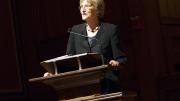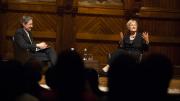In an opening address inaugurating the new academic year, President Drew Faust encouraged the greater Harvard community to keep one eye on “unprecedented opportunities” that lie ahead—and the other on the fiscal realities of a still-weakened economy.
“Harvard is about possibilities. Here, it is possible to change how our successors will think about learning and teaching,” Faust said, after being introduced in Sanders Theatre by Snider and Family professor of business administration Herman “Dutch” Leonard. “Here, it is possible to attend a Divinity School lecture on goodness by Toni Morrison, and a Mahindra Center seminar on evil. To take in—or even participate in creating—a Tony Award-winning show at the ART, or to hear Matt Damon talk about his fear of failing a playwriting course.”
But, Faust warned, these are not entirely optimistic times, and with American higher education undergoing seismic shifts, Harvard is not immune to financial concerns. These trepidations echoed her May Commencement speech, which discussed new challenges to the “fundamental assumptions undergirding American higher education and the foundations of our nation’s research enterprise.”
As technology evolves and gives rise to new educational models, Faust said, Harvard must adapt and start asking questions such as: How can we best use time in the classroom? How can we connect people and intellectual resources beyond the classroom to enhance what happens inside it? How can education get students on track to land their first job?
As other nations invest heavily in new universities and scientific institutes, Faust pointed out, the partnership between universities and the federal government in the United States is unraveling. Citing a coming $10-billion reduction from the 2013 federal research and development budget, Faust mentioned a recent survey estimating that one-third of young scientists are considering switching careers. “Faculty are finding that even grant applications with excellent peer evaluations are being rejected. Existing awards are being reduced. Aspiring younger scientists fear they will be denied the career-launching grants on which their future depends,” she said, adding: “This is a challenge not just to American universities, but to American competitiveness, and it is a financial challenge for all research universities, including ours.”
Financial aid and faculty resources will figure prominently among the goals of The Harvard Campaign, to be launched on September 21, Faust announced, as will the development of Allston, “envisioned as a place where we can experiment with the increased fluidity of boundaries between fields and schools, and between the University and the wider world.” But she noted also that the University must be aware of newly challenging economic circumstances—such as the $11-billion decline in the endowment’s value in fiscal year 2009, uneven investment results since, and significantly reduced federal research support which could see declines of as much as $40 million annually. (Dan Shore, Harvard’s vice president for finance and chief financial officer, detailed the challenges of volatile capital markets for an institution dependent on its endowment in his preface to the annual financial report published last fall.)
Although the president highlighted the Campaign as a “strong and important response to these pressures,” she also noted that it will not be a panacea for longer-term financial problems. “Our financial challenges are meaningful, but manageable,” she said. “The future we shape is up to us: we must meet these challenges with the same creativity we bring to our intellectual pursuits, and the same openness to new ways of thinking.”
In closing, Leonard joined Faust onstage to read questions asked by members of the audience and by others who had watched the event streamed live online. Issues ranged from why Harvard lacks a specific center for Latino students to what Faust wished she had had more time for in graduate school, from issues of the campaign to what Faust would like her legacy to be. “Many of the issues I have raised today are ones that seems to me to represent a kind of challenge to higher education that it has not faced, maybe, in its entire time of existence since the 1100s,” Faust replied to that last query. “We have the opportunity to shape what it is going to become.”










